

With England dead the bleakest part of the game was behind me, and by stealing Elizabeth's cities I now at least had a chance to compete, so long as I could get my economy out of the drink. (In Civ3, grabbing those cities would have meant that I had already won. In Civ4, it just gave me the potential to win.) A major step in the right direction was gaining control of the ivory at York (the first luxury resource I could actually USE), followed by my discovery of Monarchy around 200BC. Hereditary Rule meant +1 happiness in every city automatically, with the potential to go considerably higher if desired. Believe me, I've played a number of Emperor starts that were starved for happiness, and there are few things better than a healthy dose of Hereditary Rule when you're in that boat.
By 205BC I had recovered to the point that I could run 20% science at a slight profit. That might not sound like much, but it's a big improvement over losing money at 0% science.  Cottages going up all over the place now; they're pretty much the only tile improvement my workers are building. The obvious tech that I needed most after Monarchy was Code of Laws; this situation is practically screaming out for courthouses. Code of Laws would actually be more useful in this game than Currency, because with only two other civs trade routes would be less valuable than normal. At my best science rate, I can have the tech in only 68 turns. Umm, great - I'll get right on that.
Cottages going up all over the place now; they're pretty much the only tile improvement my workers are building. The obvious tech that I needed most after Monarchy was Code of Laws; this situation is practically screaming out for courthouses. Code of Laws would actually be more useful in this game than Currency, because with only two other civs trade routes would be less valuable than normal. At my best science rate, I can have the tech in only 68 turns. Umm, great - I'll get right on that.
What I need most right now is money. Since none of the AI civs have Currency yet, I can't get any from them... but fortunately, there was a barb city on the eastern edge of the map, which I figured I could burn down and then use the cash to fuel more research. I've got a bunch of highly promoted Jags here too, and nothing to do with them! When they made it to the barb city of Saxon, here's what I saw:
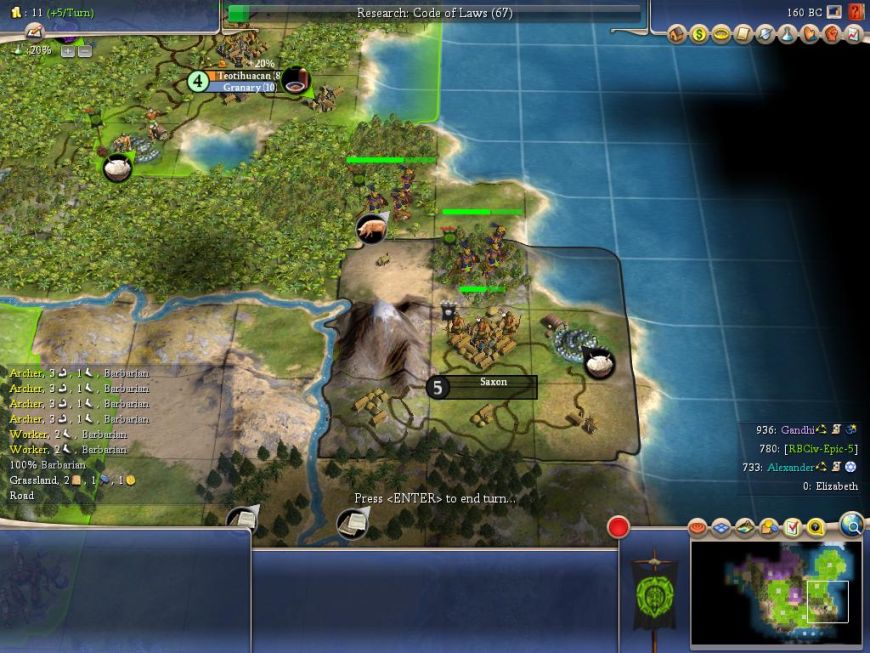
Wow!  I had been planning to burn the city down to avoid taking on more maintenance costs, but this city was so built up, I changed my mind and decided to keep it. Even better, it came with two free workers, so the city was able to improve itself. Saxon would have pigs and rice for plenty of food; I would add cottages on the floodplains tile and the river grasslands/jungle tiles to the west, then mine the hills to the south for production. It would end up being one of my strongest cities - why couldn't this have been my capital!
I had been planning to burn the city down to avoid taking on more maintenance costs, but this city was so built up, I changed my mind and decided to keep it. Even better, it came with two free workers, so the city was able to improve itself. Saxon would have pigs and rice for plenty of food; I would add cottages on the floodplains tile and the river grasslands/jungle tiles to the west, then mine the hills to the south for production. It would end up being one of my strongest cities - why couldn't this have been my capital!
Gandhi built the Pyramids in 85BC; I think the only surprise was that he hadn't built them earlier. Then on the next turn in 70BC my capture of London paid off bigtime as the city produced a Great Prophet! This is actually one of the stranger aspects of Civ4, in that if you capture a wonder it does not produce culture, but it DOES still provide Great Person points. In any case, the combined Stonehenge/Oracle was steadily producing 4 Great Prophet points every turn, and I wasn't about to complain.
With the Prophet lightbulbing Polytheism, there was no question about what I was going to do with him:

Screw the 2 shields - I want that 5 gold per turn!  The Prophet super-specialist improved my finances significantly; I went from an unsustainable rate at 30% science to nearly breaking even. And as you can see from the picture above, 30% science wasn't exactly fast... but it was something I could live with. 21 turns for a tech is not all that bad on Epic speed.
The Prophet super-specialist improved my finances significantly; I went from an unsustainable rate at 30% science to nearly breaking even. And as you can see from the picture above, 30% science wasn't exactly fast... but it was something I could live with. 21 turns for a tech is not all that bad on Epic speed.
There are also other ways to improve your science rate when your economy stinks. Running scientist specialists is one example:
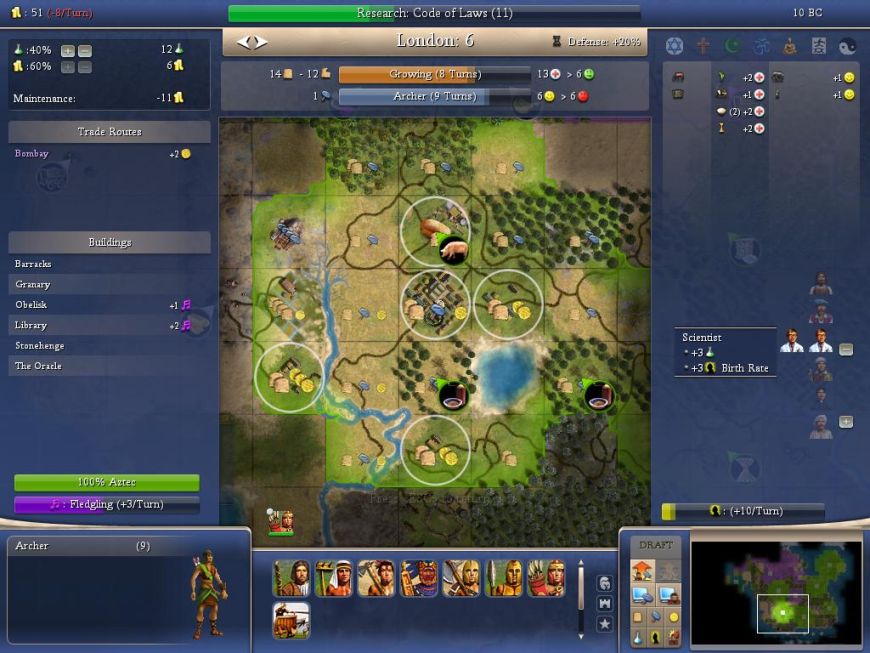
Here you get a look into London for the first time. I've already got three cottages up and running, and the pigs tile allows me to run two scientist specialists thanks to my library. I'd like to tell you that this was all planned ahead of time, but the only reason I whipped a library was to increase the culture rate here. (Remember, there's a gold tile just outside London which I will get once it hits 150 culture.) As a result, I now have Code of Laws down to something resembling an actual research time. Also note that I have wines listed in the resource box; I traded my only pigs to Gandhi for wines as soon as we established a trade route. With those two happiness resources, plus Hereditary Rule from the defender, I can actually get my cities up to size 6 now. Yes, I am beginning to get out from under the PAINFUL happiness cap as the game moves into the AD years. I'll be interested to see how everyone who plays this game manages that end of things. It certainly wasn't easy.
I received a further boost to my happiness quandary when Gandhi's religion started spreading into my territory:
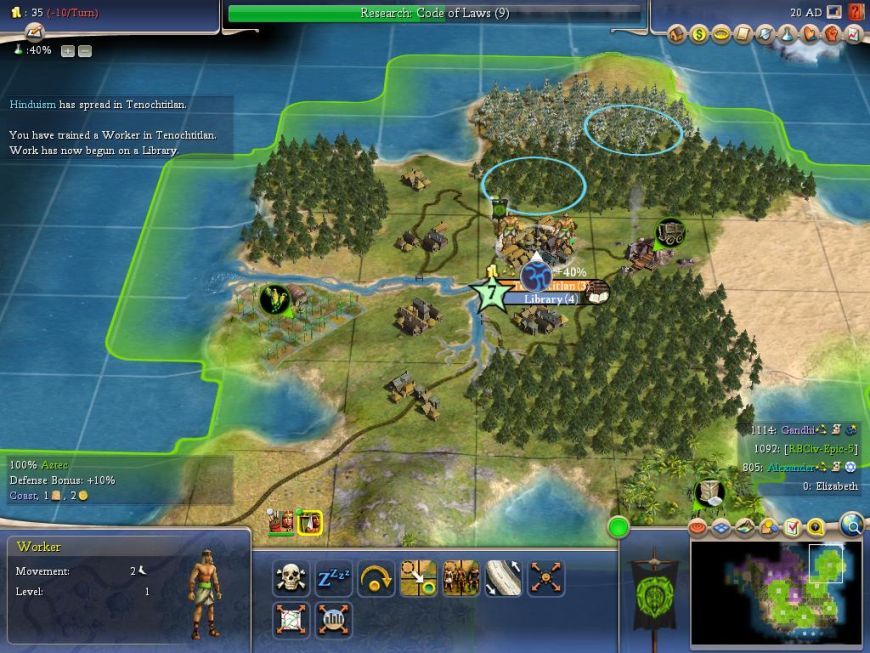
When you have Open Borders with Gandhi, it's only a matter of time before his religions start to trickle in. This confirmed that I would be going with Hinduism as my religion; the first religion to spread to me was actually Buddhism (at Teotihuacan), but Hinduism spread to Nottingham and then here to my capital. I swapped to it on this turn in 20AD and never looked back. I had the capital build a temple and then a monastery for Hinduism, and it ended up supplying most of the missionaries for my civ. (I couldn't exactly afford to take on the extra cost of Organized Religion, nor did I even have Monotheism tech at this point!)
With Hinduism plus a cheap Spiritual temple, my cities could now reach size 8, which was simply a vast improvement over where I had been a few centuries earlier (cities unhappy at size 3!) As my cities continued to grow and add additional cottages, I became more and more competitive vis a vis the AI civs. Early in the AD years my increasing population pushed my score past Gandhi:
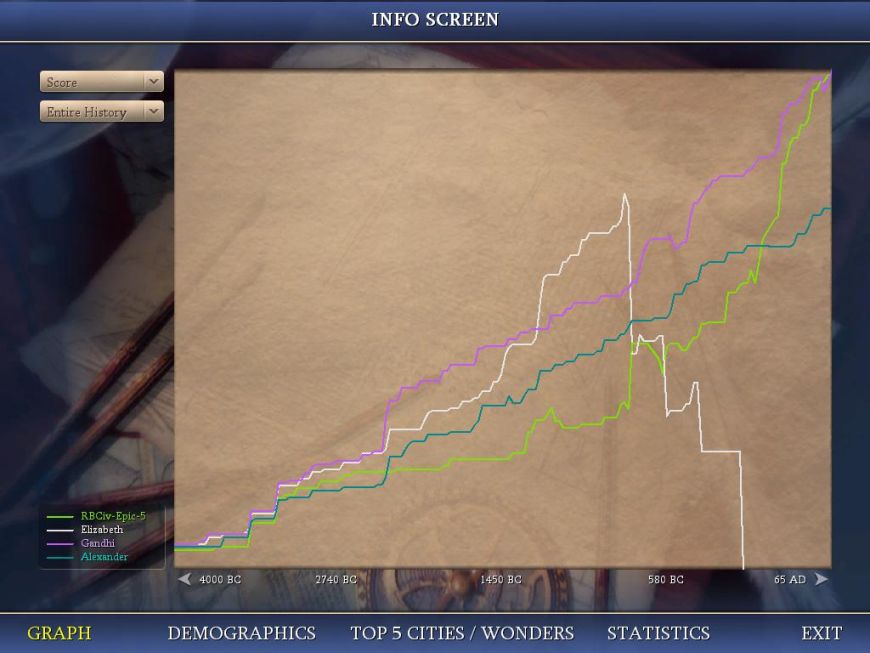
I usually don't post score pictures, as score really doesn't indicate very much about the actual strengths of each civ, but this graph had such dramatic changes that it was unusually noteworthy. While Gandhi and Alex both have fairly linear growth on the graph, Elizabeth explodes upwards when she builds her two wonders, leaping far out in front of the competition... only to come crashing down catastrophically as I capture her cities. The dip where I captured London (715BC) is particularly noticeable. Meanwhile, my score jumps upwards NOT so much when I take English cities, but later on, once the fighting was over and I was finally able to get some happiness into them, therefore reaching higher sizes. Just goes to show that the score is mostly driven by population in this game (although territory, technology, and wonders also factor in). You probably won't see a graph that looks like this too often!
By about 100AD, I was running a sustainable deficit at 40% science and Code of Laws was on the horizon. Once I had courthouses up and my economy recovered to at least 50% science, I would be able to take on more cities and therefore could begin to move after Gandhi. Interestingly enough, Alexander was actually leading in GNP by a pretty significant margin.  Wow. Don't see that too often. Alex actually discovered Code of Laws exactly one turn before me (140AD to my 155AD), and therefore founded Confucianism. Heh. I had already gone to Hinduism and wouldn't be using that religion anyway, but that's a pretty amazing coincidence, considering how long I had been researching the tech.
Wow. Don't see that too often. Alex actually discovered Code of Laws exactly one turn before me (140AD to my 155AD), and therefore founded Confucianism. Heh. I had already gone to Hinduism and wouldn't be using that religion anyway, but that's a pretty amazing coincidence, considering how long I had been researching the tech.
Once I did have Code of Laws, however... 
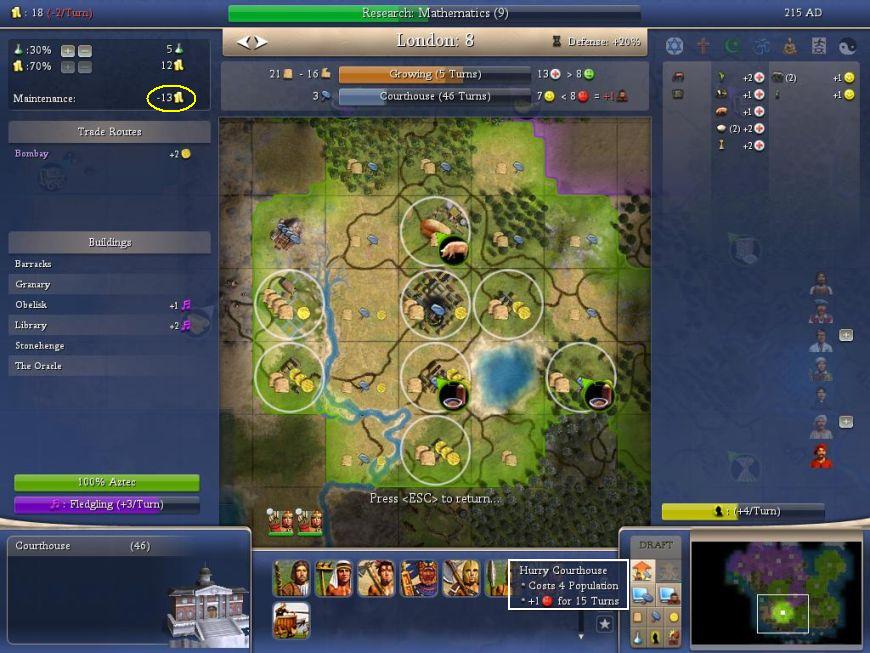
Time to get cracking on those courthouses! (Just look at that -13 maintenance cost, yowza!) I let my cities grow into unhappiness and then whipped courthouses at London, Nottingham, York, and Saxon in short order. Once my people recovered from being ritually slaughtered, I would be in much better shape financially.
Alex asked me to trade him ivory in 215AD. Umm... no. Then he demanded ivory in 260AD. Well if you put it that way... I gave it to him, and proceeded to cancel the deal 10 turns later. One thing I could not afford to do was get on Alex's bad side; Gandhi may be a military pushover, but Alex is not. I didn't really see much of a need to invade Alex's little peninsula in the far west, so I figured I might as well try to stay on good terms with him. What I realized from all this fuss over ivory was that I had a monopoly on the world's supply - both sources, at York. Now that's... interesting.  As a result, once I finished researching Mathematics, I decided not to head for Currency, but instead to grab Construction instead. Let's see how well Gandhi holds up against a catapult/elephant assault!
As a result, once I finished researching Mathematics, I decided not to head for Currency, but instead to grab Construction instead. Let's see how well Gandhi holds up against a catapult/elephant assault!
By 320AD, my economic recovery was nearly complete:
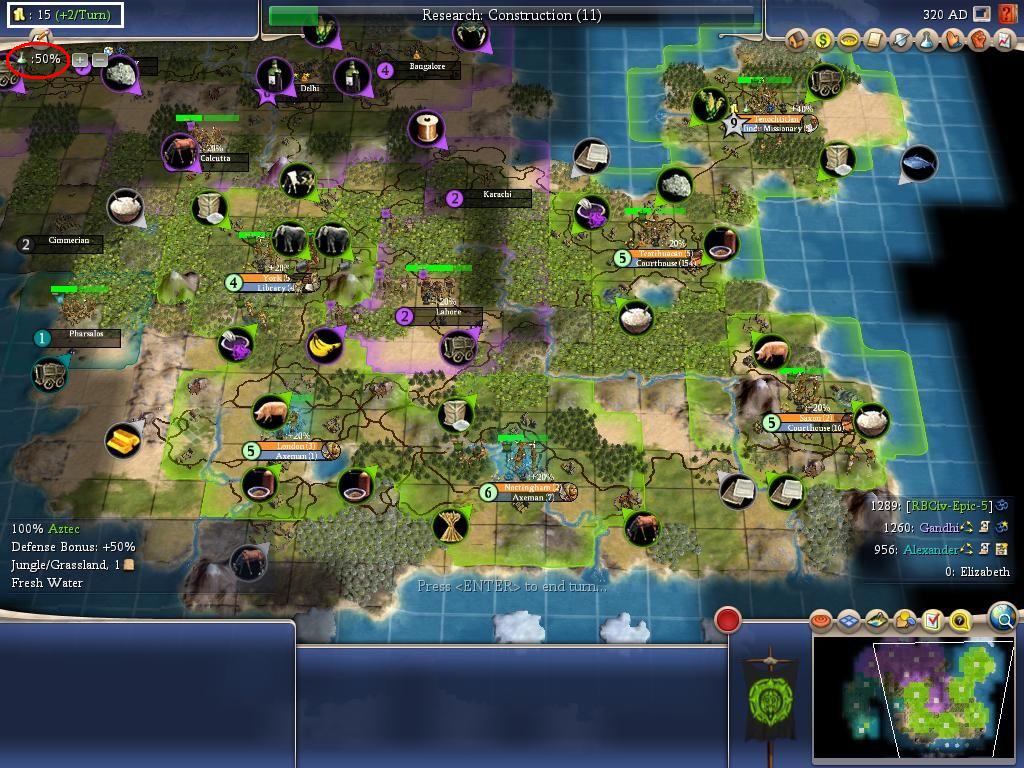
Behold the power of courthouses.  Back to 50% science at a slight positive mark. Considering where I was a couple of centuries ago, this is nothing short of amazing. Of course I'm also running tons of cottages everywhere, especially at Tenochtitlan and Teotihuacan, but that's par for the course. My captured English cities provide almost all of the production for my civ. As far as what I'm building, I've got several axes in the works to hit Gandhi. I'm not ready to wipe him out yet, but a limited war to take Lahore and Karachi seems in order. Those are blights on my map that need to be wiped out before the big final war sometime in the future.
Back to 50% science at a slight positive mark. Considering where I was a couple of centuries ago, this is nothing short of amazing. Of course I'm also running tons of cottages everywhere, especially at Tenochtitlan and Teotihuacan, but that's par for the course. My captured English cities provide almost all of the production for my civ. As far as what I'm building, I've got several axes in the works to hit Gandhi. I'm not ready to wipe him out yet, but a limited war to take Lahore and Karachi seems in order. Those are blights on my map that need to be wiped out before the big final war sometime in the future.
Take a look at the GNP graph from the same date:
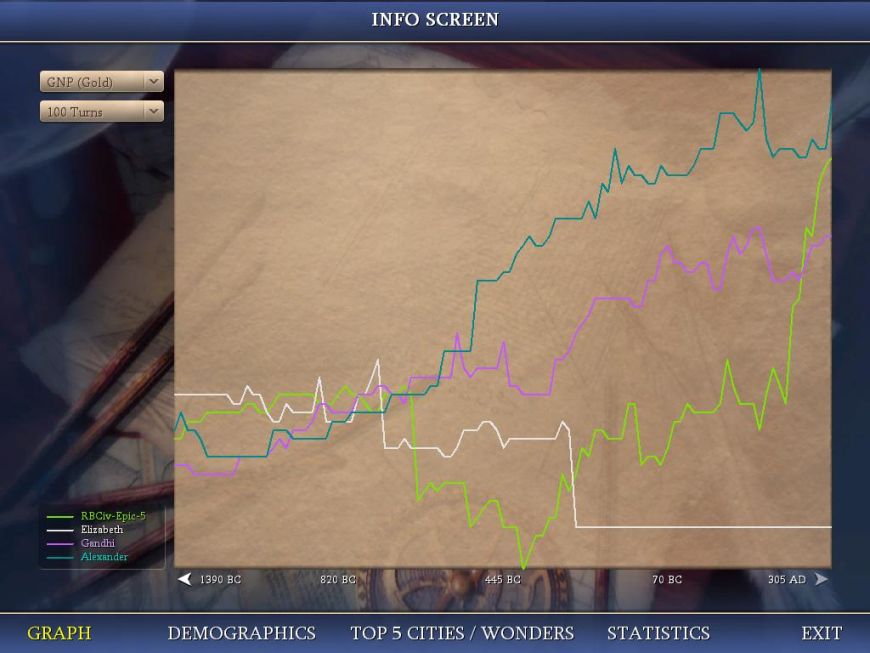
This does a good job of demonstrating the "beyond horrible" condition of my economy following the early English war. Now the white line that goes off to the right shows that Elizabeth is dead; since her civ is gone, the GNP for the English is zero. Normally you don't see this kind of line on the graph, since a zero score falls off the bottom of the screen. Yet my GNP actually dips BELOW that zero line, indicating that there was a point in time where the total net worth of my economy was actually less than zero! Now that's truly pathetic.  Fortunately I was able to recover and leap past Gandhi; with time, I will pass Alex as well, so long as I don't take on more costs by capturing additional cities.
Fortunately I was able to recover and leap past Gandhi; with time, I will pass Alex as well, so long as I don't take on more costs by capturing additional cities.
Of course I have no intention of stopping my attacks any time soon. 
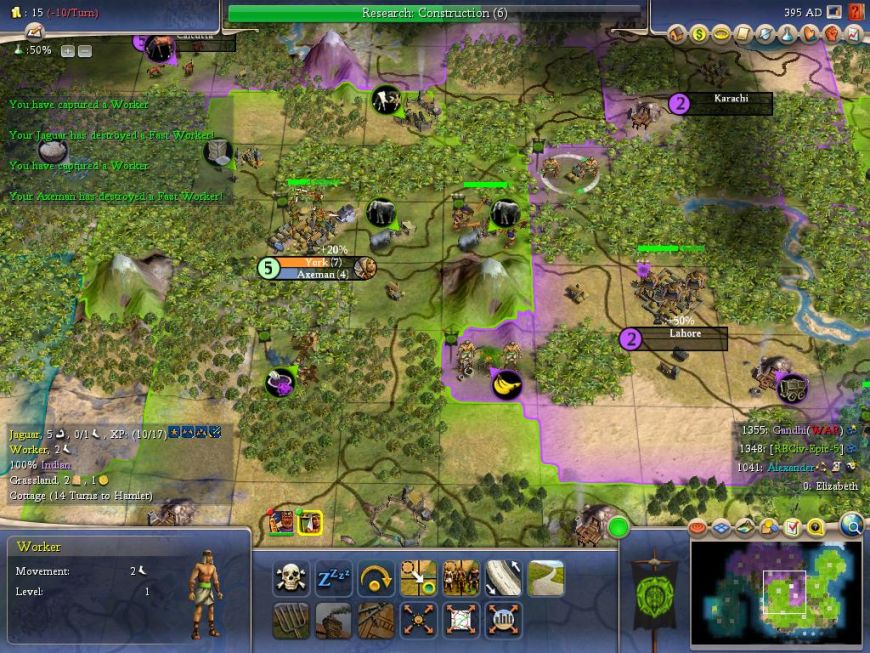
I declared war on Gandhi in 395AD, grabbing two workers on my border in the process. With the way Gandhi was flashing those workers around, he was practically begging me to invade. I actually had a tough battle at Lahore because the city had walls (still don't have any cats as yet, unfortunately), but I ended up taking it at the cost of two axes and an elite Jag. What was surprising was how quickly the war weariness ramped up in my cities; I had not only the usual "we won't go" unhappiness, but also "we refuse to fight our brothers in the faith" unhappy faces because Gandhi controlled the Hindu holy city. You don't see that too often.
When Karachi fell, it was time to end the war:
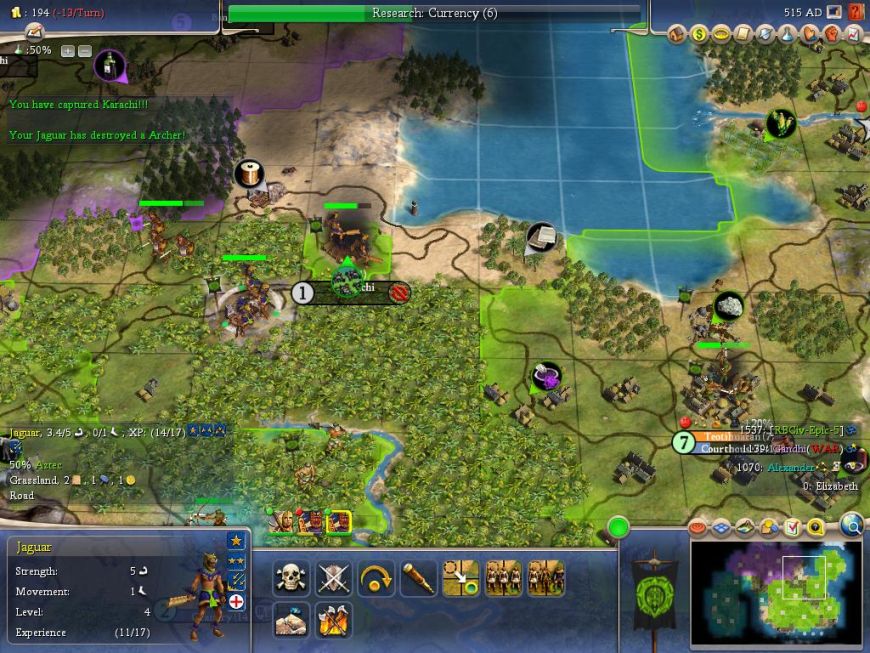
My borders looked much better with those two cities now under my control (check out the minimap). Gandhi was of course willing to sign peace, and not only that, we immediately resumed trading again! I once again sent him pigs for his wines. Sometimes Gandhi is a little too peaceful for his own good, ya know? We did have a +6 from shared faith though, which may have contributed to his friendliness. The other thing that this war did was get me up to 8 cities, which allowed me to start work on the Forbidden Palace at London (which would be sped along by some chopping). I had met the four courthouses requirement some time ago, but you also need eight cities (which seems out of whack for a Tiny map; probably something that we forgot to adjust for map size). That was a major priority, to say the least.
By the way, look at the cottages ON Calendar resources at Teotihuacan. If I could never hook them up, might as well get SOME use out of them! Strange game.
I noticed that both Alex and Gandhi were moving some military units around in the west, and sent a Jag over to investigate. It turns out that they were beating their heads against the barb city that had sprung up over there, and weren't getting anywhere:
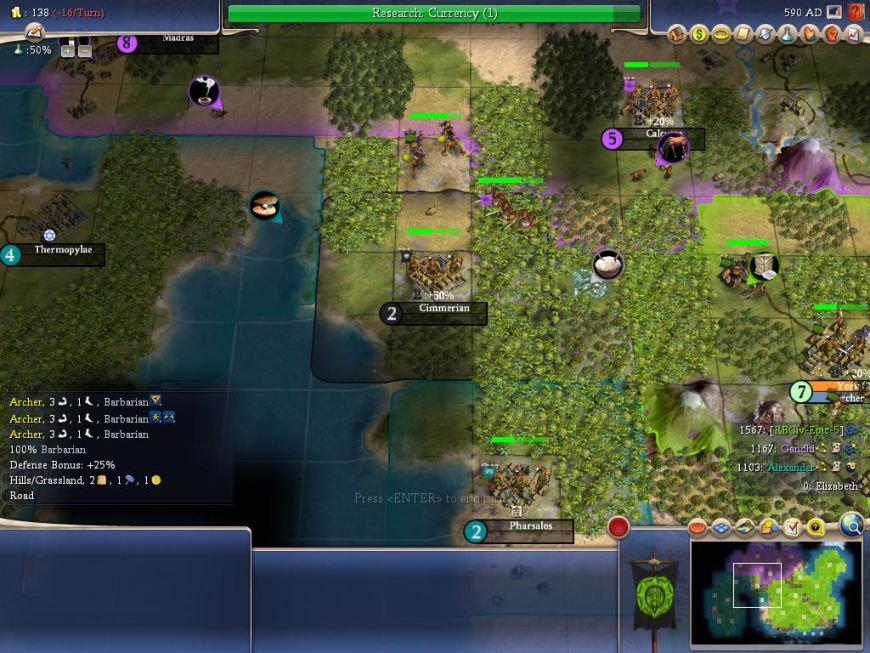
Cimmerian had archers, on a hill, with city walls. Needless to say, that city wasn't going anywhere until the AI civs either brought a large stack or advanced in military technology to better units. Every couple turns, Alex would throw some horses at Cimmerian, and Gandhi would waste a sword or two. Since they kept sending them in piecemeal fashion, it was obvious that they were never going to succeed barring some ridiculously lucky dice roll, even though the AI civs get huge bonuses against barbs. All in all, it was one of the stupider things I've seen in some time.
After researching Currency, I went on to Civil Service next. Any city that had decent production was working on cats or elephants for an upcoming war with Gandhi. I looked at the F8 screen and did some math, which confirmed that I would be able to win a Domination victory just by attacking Gandhi. That was a relief; I definitely didn't want to mess with Alex if I didn't have to. It also influenced how I was going to play this one out; if I had to take out both AI civs to win, I would probably wait until later when my economy was stronger before attacking. But if it's just going to be Gandhi... better to do this as soon as possible, especially during the narrow window of opportunity when I had elephants but before he could get longbows. The slow tech pace without trading enabled certainly helped in that regard.
When my money started to run out while researching Civil Service, I decided to procure some more at Gandhi's expense:
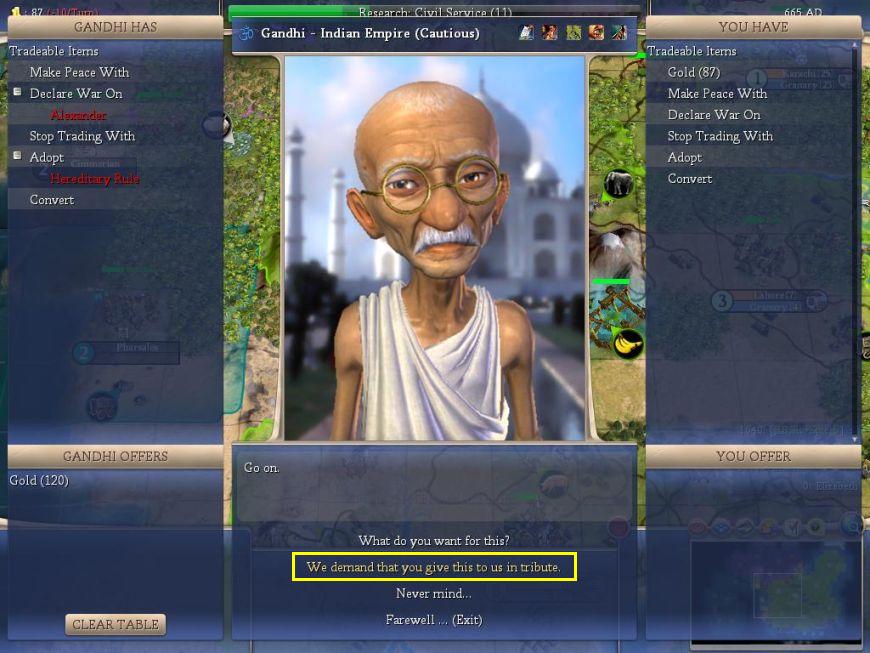
Naturally he paid. If you are ranked higher in power than the AI civs, you can bully them around pretty good and extort some cash. If you have Friendly relations you can also get them to give you money quite often. A lot of this does depend on the AI personality though - I certainly wouldn't try this with Alex! Gandhi is a bit of a sitting duck though. The best way to deal with an AI civ like Gandhi is to rough him up, keep the pressure on - don't let him tech his way into space peacefully. (It's just the opposite for someone like Montezuma, where you want to out-tech him and attack once he's fallen behind.) The AI personalities really add a ton of spice to this game; they greatly exceeded my expectations, that's for sure. Before the game was released I expected we'd be using the random personalities setting a lot, but frankly I enjoy the default personalities way too much. Individually each AI might be predictable, but they can combine in so many ways that the game continues to remain interesting for me. (This is one area where I disagree somewhat with Sirian; certainly, the AIs are too similar on the level of grand strategy, but tactically they are different enough to continue making things fresh, at least for now.)
A lot of quiet turns followed. Gandhi built the Great Library in 800AD, which was a good sign; I WANT him messing around at the top of the tree instead of hitting the military techs at the bottom. I discovered Civil Service in 830AD, swapped to Bureaucracy, and then paused to grab Poly/Monotheism so that I could use my second Great Prophet on Theology. While I was doing that, London finished the Forbidden Palace:
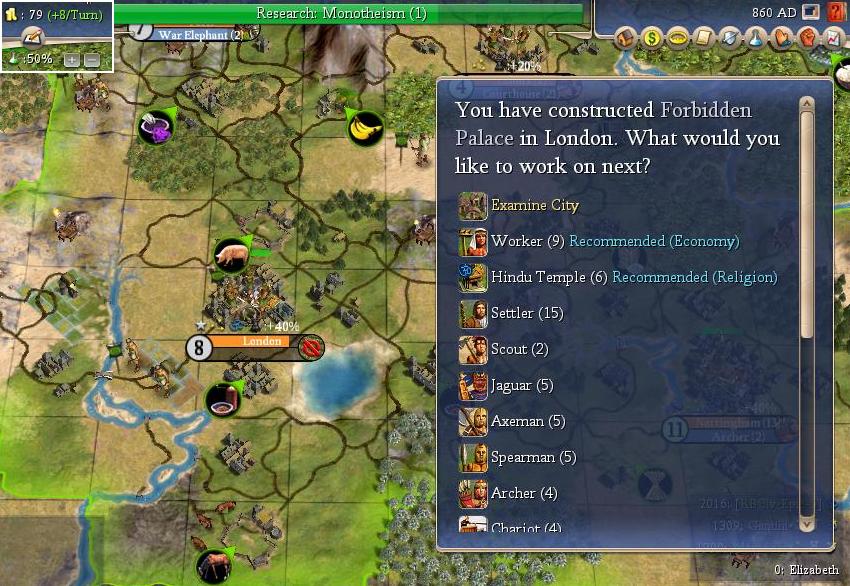
Just look at that economy now! We're in the money! If I stayed out of war now, I could easily build a formidable research machine and out-tech the AI civs for good. All I have to do is avoid taking on more cities to drag down the economy once more.
Naturally I declared war on Gandhi the same turn that this picture was taken.  Go to the next page for the conclusion.
Go to the next page for the conclusion.



